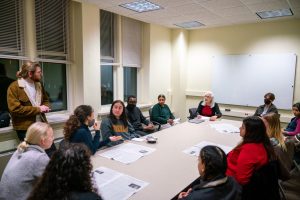Fictional Oberlin Grad Ventures to Bolivia in Semi–Autobiographical Novel
April 6, 2012
Plant Teacher, a novel by Caroline Alethia published this past January, chronicles the story of a fictional Oberlin College graduate traveling in Bolivia during a time of political crisis. Although Alethia is herself a Wellesley College graduate, her experiences visiting Oberlin’s campus during her own college years left her with a favorable impression of the College, inspiring the choice of her protagonist’s alma mater.
A talented writer who has worked as a journalist, technical writer for the United Nations and editor for international publications, Alethia lived in Bolivia just before writing Plant Teacher. Drawing from these experiences, her novel follows the development of a relationship between two recent college graduates and American expatriates, Cheryl and Martin — Cheryl being the Oberlin graduate — who meet in La Paz, Bolivia.
Their complex relationship is shaped and informed by the political disturbances they witness; specifically, Bolivia’s democratically elected president’s devolution into a demagogue. Alethia’s account is infused with the kind of sympathy for the situation that only comes from real-life experience. Through use of seemingly disconnected themes, an array of writing styles including poetry, lyrical prose, journal excerpts and historical political narrative, and personal translations of her own experiences in Bolivia, Alethia indexes the narrative content within the text’s syntactical structure.
A serious and evocative novel, Plant Teacher is a modern fusion of paradoxical extremes that reveals the rich understanding that develops between two displaced characters who meet in this broken Andean nation.
Plant Teacher immediately draws the reader into the challenges and complications of its characters. Early on, for example, Alethia writes, “In 1972, a hippie in Oakland, California, flushed a full syringe of lysergic acid diethylamide down the toilet.” The immediacy and incongruity of the statement indicate its importance, but the novel does not reveal until much later the ways in which the syringe causes significant consequences in the lives of her characters.
Stereotypes assumed during first impressions are undermined by honest realizations as the characters and the plot evolve. Since childhood, for instance, main character Martin felt like an outsider, in terms of personality within his family and racially within in a larger social culture. He’s traveled around a great deal, has dabbled in numerous hobbies, perhaps subconsciously trying to find some place where he belongs or a standard to which he feels suited. Martin finds some peace in developing an understanding for both his American and Bolivian heritage, the previous absence of which was at the heart of his struggles to define himself. With this confidence, he becomes far more courageous than we initially believed possible. We are, however, left unsure whether he’s been this way from the start, or whether he’s evolved into this resolute character as he battles certain challenges while he seeks to discover his purpose in Bolivia.
Martin is somehow able to discover a purpose for himself in his newfound understanding of his Bolivian/American heritage. Alethia illuminates the relation between two nations in Martin’s character as he discovers peace with his interracial heritage. The connection between these two very different cultures is revealed in character migration across borders, as well as the journey of the little LSD syringe that makes its way from Oakland all the way to the marshes of Bolivia, where it is then consumed by various organisms before it is cultivated and subsequently ingested by Martin. The process becomes a metaphor for toxicity that permeates our global community.
Cheryl appears opposite from Martin as she enters into a new culture after never having traveled outside her small town in Virginia. She is unexpectedly intelligent, brave and knows a great deal about Bolivian culture, but in escaping the safety of her home back in Winchester, Virginia, she also realizes that she is starved for freedom. She dabbles with numerous relationships before she realizes that what she wants is her own independence.
Despite Martin’s severe hallucinations and Cheryl’s own challenges with social indecision, they connect with each other unexpected ways. Ultimately these two seemingly opposite characters develop an unexpected affection for each other as each comes to understand the other’s challenges as well as each other’s secrets.
Plant Teacher stretches the mind to contemplate relations that would otherwise be assumed as disconnects, addressing the issues of contemporary society in compelling ways. Alethia will help challenge you to look beyond stereotypes and to understand cultures, individuals and traditions as an intricate sum of relations. With first-hand experience in the Bolivia’s rich culture, Alethia allows you to see this nation as though you were there at its center. She is able to maintain the sense of immediate experience even as she pulls the reader back and forth in time, constructing a narrative whose importance is located within its awareness of the past and its sensitivity to the present.

























